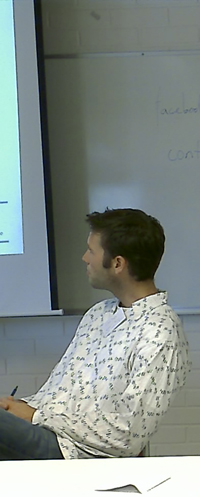Notes from the IPID ICT4D PG symposium 2008, Mekrijärvi Research Station, Joensuu University, Finland. 8 and 9 September, 2008.
Pieter Joubert, University of Pretoria: Socio-Technical Assumptions and Sustainability in ICT4D
High rate of failure or information systems in developing countries (Heeks, 2002). Due to several reasons: skills, infrastructure management, etc. What makes a project sustainable?
Several projects in South Africa were evaluated to find major trends. Methodology: semi-structured interviews, document analysis, direct observation. Some findings:
- Assumed the technology would work
- Assumed only technical skills were required
- Reported to have patience with digitally illiterate users
- Assumed there would be technical support
Level of technical maturity model:
- assumed
- recognised: recognition of importance of technical skills
- dedicated: dedication of resources to technical skills
- integrated: integration of technical skills into the social base
Tuija Tiihonen, HIS-unit, University of Kuopio: Socio-technical IS context in Organizations – How to Figure it?
To map Information Systems context, to see why do failures (and their stronger effect) in implementation happen, cultural environment and work habits, map user needs, see how IS perform at the different levels of the organization…
For IS professionals, for IS education, to classify and divide different categories and systems…
Levels of context: individual, group / activity, organizational, societal.
Marcus Duveskog, University of Joensuu: Development of Digital HIV/AIDS Learning material based on Tanzanian students real life stories
Goal: develop a platform for HIV/AIDS counselling and information.
Flash chosen as main platform: portable, online, powerful in graphics and animation. Major problem with flash is that is no free software, so to develop something you need the licensed software [my comment: and, besides, flash is a non-accessible black box (though there have been recent improvements in this field)].
HIV/AIDS materials based on students real stories that get involved in the project, so they generate relevant material and develop a sense of ownership.
Next challenges: how to go mobile? how to make it simple for students to share their stories online? how to make material more interactive?
Kari Valkama, Helsinki University: Sustainable development on language tools / Usability of language tools
Technological challenges for development: complexity.
Language tools is software for documenting and developing languages.
Usable Language Tools based on trust: protecting the user’s data, easy to use, consistent, following the user’s mental model
Jef Raskin’s adaption of Isaac Asimov’s robotic laws applied to software:
A computer shall not harm your work or, through inaction, allow your work to come to harm
A computer shall not waste your time or require you to do more work than is strictly necessary
Third Annual ICT4D Postgraduate Symposium (2008)
If you need to cite this article in a formal way (i.e. for bibliographical purposes) I dare suggest:
Peña-López, I. (2008) “Third Annual ICT4D Postgraduate Symposium (IV). Thematic session 3: sustainability and performance” In ICTlogy,
#60, September 2008. Barcelona: ICTlogy.
Retrieved month dd, yyyy from
https://ictlogy.net/review/?p=965
Previous post: Third Annual ICT4D Postgraduate Symposium (III). Thematic session 2: Education
Next post: Third Annual ICT4D Postgraduate Symposium (V). Erkki Sutinen: Innovations workshop
 RSS feed for comments on this post.
TrackBack URI
RSS feed for comments on this post.
TrackBack URI


